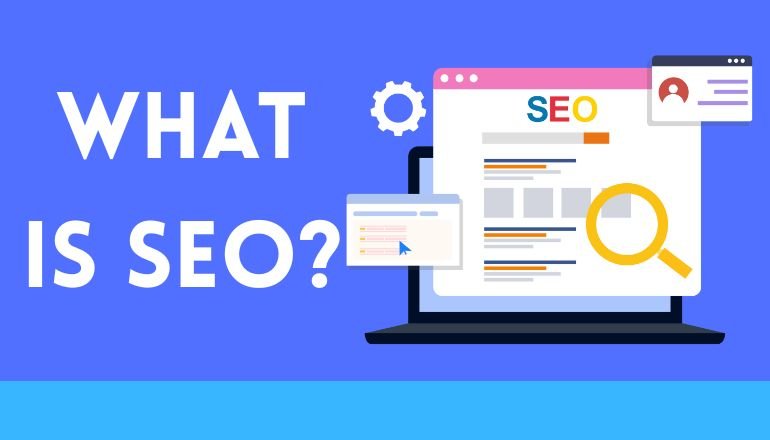
Search Engine Optimization (SEO) is a vital digital marketing strategy that helps businesses increase their visibility on search engines like Google. It involves a series of techniques aimed at improving the ranking of a website, ensuring that it appears on the first page of search results. The higher a site ranks, the more likely it is to attract organic traffic. Whether you’re a small business or a large enterprise, SEO can help boost your online presence, drive targeted traffic, and increase your business’s credibility.
Table of Contents
- Introduction What is SEO
- Why is SEO Important?
- Key Elements of SEO
- On-Page SEO
- Off-Page SEO
- Technical SEO
- How SEO Works
- SEO vs. SEM
- The Importance of Content in SEO
- How to Improve SEO for Your Website
- SEO Tools to Consider
- Common SEO Mistakes to Avoid
- Conclusion
- FAQs
1. Introduction What is SEO
SEO stands for Search Engine Optimization, which is a process designed to increase a website’s visibility in search engine results pages (SERPs). It involves optimizing different aspects of a website, from content to technical structure, to improve its ranking. SEO helps businesses attract more visitors by ensuring they show up when potential customers search for related keywords.
2. Why is SEO Important?
- Increased Website Traffic: SEO helps drive organic traffic to your website by improving its ranking.
- Higher Conversion Rates: Properly optimized websites often convert visitors into customers.
- Credibility: Websites ranked higher on search engines are often seen as more credible by users.
- Cost-Effective: Unlike paid advertising, SEO is a long-term, cost-effective strategy.
3. Key Elements of SEO
SEO is divided into several components that work together to enhance visibility:
- On-Page SEO: Involves optimizing individual web pages.
- Off-Page SEO: Focuses on improving site reputation through backlinks and external factors.
- Technical SEO: Ensures that a website’s structure is optimized for both users and search engines.
4. On-Page SEO
On-Page SEO is the process of optimizing elements on your website that are directly within your control. This includes:
- Keyword Optimization: Using relevant keywords in titles, headings, and throughout your content.
- Meta Descriptions: Writing compelling meta descriptions to encourage click-throughs.
- Internal Linking: Linking to other pages on your site to enhance user experience and distribute link equity.
5. Off-Page SEO
Off-Page SEO focuses on strategies that happen outside of your website but still impact your rankings:
- Backlinks: Obtaining high-quality backlinks from authoritative sites.
- Social Media: Promoting your website through social media platforms to increase engagement.
- Brand Mentions: Getting mentioned on other websites, even without a link, can improve SEO.
6. Technical SEO
Technical SEO involves optimizing the technical aspects of your website:
- Mobile Optimization: Ensuring that your website is mobile-friendly.
- Page Speed: Reducing load times to improve user experience and ranking.
- Secure Website (HTTPS): Security is a ranking factor, so using HTTPS is essential.
7. How SEO Works
Search engines like Google use complex algorithms to rank websites based on hundreds of factors. SEO works by optimizing these factors to ensure your site ranks higher. Google, for instance, looks at factors like content quality, keyword relevance, user experience, and the technical structure of the website.
8. SEO vs. SEM
SEO (Search Engine Optimization) and SEM (Search Engine Marketing) both aim to increase a website’s visibility. However, they differ:
- SEO: Focuses on organic methods, improving rankings over time without paying for ads.
- SEM: Involves paid advertising, where businesses bid for ad placements on search engine results.
9. The Importance of Content in SEO
Quality content is at the heart of SEO. Search engines prioritize content that is informative, relevant, and valuable to users. This includes:
- Keyword-Rich Content: Using the right keywords in your blog posts, articles, and product descriptions.
- User Experience: Offering content that is easy to read, engaging, and accessible.
- Regular Updates: Keeping your content fresh and relevant.
10. How to Improve SEO for Your Website
Improving SEO requires consistent effort:
- Conduct Keyword Research: Identify keywords that your audience is searching for.
- Optimize Your Content: Ensure that your content is well-written and keyword-optimized.
- Improve Website Speed: A faster website offers a better user experience and better rankings.
- Gain Backlinks: Create content that others want to link to.
11. SEO Tools to Consider
Using SEO tools can streamline the optimization process:
- Google Analytics: Provides insights into your website’s performance.
- Google Search Console: Helps identify issues affecting your site’s performance in search.
- SEMrush: A comprehensive tool for keyword research, site audits, and competitive analysis.
12. Common SEO Mistakes to Avoid
To get the best results, avoid these common SEO mistakes:
- Keyword Stuffing: Overusing keywords in an unnatural way.
- Ignoring Mobile Users: Failing to optimize for mobile can hurt rankings.
- Not Updating Content: Content that’s outdated may no longer rank well.
Conclusion
Understanding what is SEO and its implementation is essential for anyone looking to improve their online presence. With a solid SEO strategy, you can enhance your website’s visibility, attract more visitors, and ultimately, grow your business. SEO is an ongoing process that requires continuous learning and optimization. Whether you’re a beginner or an experienced digital marketer, mastering SEO can significantly impact your website’s success.
FAQs
1. What is SEO and how does it work?
SEO is the process of optimizing a website to rank higher in search engine results, making it more visible to users searching for relevant topics.
2. Why is SEO important for my website?
SEO helps increase organic traffic, improve user experience, and enhance website credibility, driving more targeted visitors to your site.
3. How long does it take to see results from SEO?
It typically takes 3 to 6 months to see significant improvements in search rankings and organic traffic.
4. Can I do SEO on my own?
Yes, with the right tools and knowledge, you can implement basic SEO strategies. However, for more complex issues, a professional SEO service is recommended.
5. Is SEO a one-time process?
No, SEO is an ongoing process that requires regular updates and optimizations to maintain and improve rankings.






